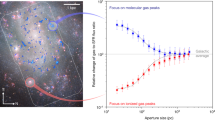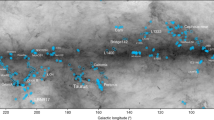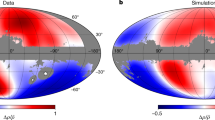Abstract
HOWEVER discordant the present views in astronomy are, they all concur in considering Milky Way clouds as real agglomerations of stars and regard the collection of stars surrounding the sun as one of these clouds (local system). To the common-sense evidence based on the apparently cloud-like character of the Milky Way one usually adds the following argument. The space density of stars in the direction of some galactic clouds first decreases and then increases again, thus indicating the existence of separate stellar agglomerations. The general belief in the existence of the local system is based on two facts: the well-known decrease in apparent star density with increasing distance from the sun, and the distribution of brighter early stars and diffuse nebulae along a circle inclined at several degrees to the galactic equator.
This is a preview of subscription content, access via your institution
Access options
Subscribe to this journal
Receive 51 print issues and online access
$199.00 per year
only $3.90 per issue
Buy this article
- Purchase on Springer Link
- Instant access to full article PDF
Prices may be subject to local taxes which are calculated during checkout
Similar content being viewed by others
Author information
Authors and Affiliations
Rights and permissions
About this article
Cite this article
GERASIMOVI, B. A Unitary Model of the Galactic System. Nature 137, 739–740 (1936). https://doi.org/10.1038/137739b0
Published:
Issue Date:
DOI: https://doi.org/10.1038/137739b0
Comments
By submitting a comment you agree to abide by our Terms and Community Guidelines. If you find something abusive or that does not comply with our terms or guidelines please flag it as inappropriate.



